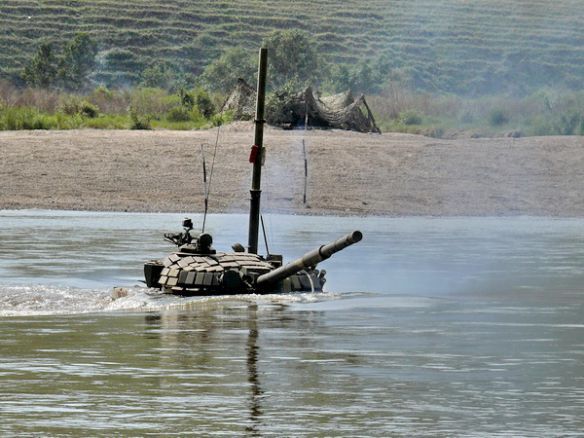Global General
Russia: Vostok-2010 military drills successful
(Xinhua)
Updated: 2010-11-24 17:23
 |
Large Medium Small |
Published on July 09, 2010
|
 A tank fords water obstacles during the Vostok-2010 exercises in this undated photo. [Photo/Xinhuanet] |
Russian troops of the Siberian Military District have returned to their permanent bases after accomplishing all tasks during the large-scale Vostok-2010 military exercises, RIA Novosti news agency reported.
The Vostok-2010 exercises in Siberia and the country's Far East started on June 29. They involved 20,000 troops, up to 2,500 pieces of military hardware, 70 warplanes and 30 warships.
"All drills planned for the Vostok-2010 exercises are over. The troops accomplished a large number of practical tasks from June 29 through July 8," the press service of the Siberian Military District was quoted as saying in a statement on Friday.
The exercises were dedicated primarily to the deployment of additional troops in Siberia and the Far East to reinforce the existing military contingent in the region in case of a military conflict.
The exercises also included live shell shootings, simulated airborne assaults and amphibious assault landings. The Siberian Military District deployed at least 10,000 troops and 1,500 pieces of military hardware at four training ranges.
"Six separate tactical drills with the firing of live ammunition were conducted at the Tsugol, Telemba, Yurga and Burduny military training ranges during the exercises," the statement said.
Russia holds the Vostok strategic command-and-staff drills every two years. The current Vostok drills exposed some weakness of the Russian air force, the statement said.
The transferring of Su-24 and Su-34 bombers from western part of the country to Far East with two consecutive in-flight refueling became one of the highlights of the manoeuvers. However, Russian air force needs, at least, a large number of tanker aircraft, military aircraft capable of in-flight refueling and enough space for the transport of auxiliary staff and cargoes.
The biggest difficulty for the Russian troops is the lack of competent crew, which forced the military to assign only senior officers with rich flying experience to serve as captains, because many pilots are considered inexperienced.
The statement urged top leaders of the government and the military to make a decision to resume the production of tanker aircraft and strengthen the training of new crew.